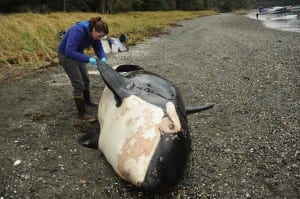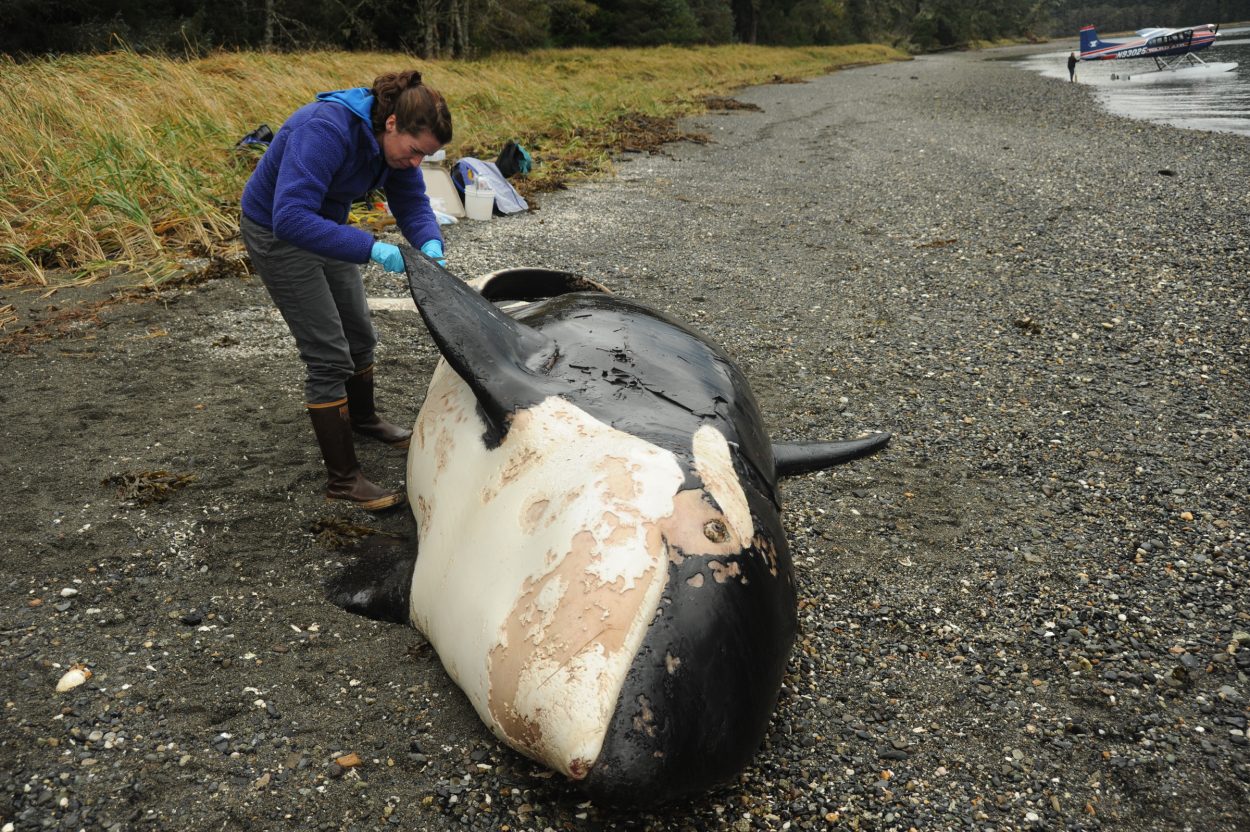Researchers know a little more about what caused the death of a killer whale found by a moose hunter on Kupreanof Island last October. The animal likely died from a stroke and was probably searching for food.
Audio Player
Local volunteers Don Holmes, president of Petersburg Marine Mammal Center, and Scott Roberge secured the orca carcass on the beach at Portage Bay after hunter Greg Lutton reported the find in October. The local Marine Mammal Center is part of a statewide marine mammal stranding network that responds to beached and entangled whales.
Holmes said finding an orca carcass washed up on the beach is an unusual event. “Normally whales in general or orcas specifically tend to become part of the food chain in the water and they never come ashore,” Holmes said. ‘So you get a lot of information from a necropsy.”

NOAA Fisheries marine mammal expert Sadie Wright examines the carcass of a killer whale discovered near Petersburg, Alaska. NOAA Fisheries/John Moran Taken under permit.
Researchers were lucky that the find was reported not long after the whale’s death and the carcass was still in relatively good condition. Holmes was part of the team that included scientists from the University of Washington who returned to the carcass to do a necropsy and bring back samples from the animal.
“The whole process of going in and doing a necropsy on an animal that large would be very physically very similar to butchering a moose only another order of magnitude bigger,” Holmes explained. “So very large animal to take apart and to get at it you have to go from the outside in, including all the blubber, so there’s a lot of physical labor involved. And then while you’re doing that you’re looking for signs of what was the cause of death. So the whole time it isn’t just taking it apart, it’s taking it apart with a lot of observation going on.”
The whale was identified as an offshore orca documented as far back as the early 1990s. She had been sighted from California to the Bering Sea and was identified with a number, 0059.
Researchers compiled a report on the testing done on the samples this winter. Holmes said the whale had lost weight and had lack of fat around its head. “All of this was before it died,” he said. “I mean it had lost a lot of body mass somewhere along the line. The necropsy itself showed that beside the loss of blubber, mass, that the animal was suffering from coronary artery disease and probably died, the actual event that probably killed it was probably a cerebral hemorrhage, a stroke is probably what killed it.”
Holmes said it was unusual for an orca like this one, which usually stays offshore, to make its way to Portage Bay. “Because of the loss of tissue, the lack of body mass, the animal had been a long time between meals. And so I would suspect it was just trying to find anywhere it could.” In its stomach researchers found some kind of a mammal vertebrae, probably from a seal.
Offshore killer whales typically eat sharks, and are different than the fish-eating resident whales or marine mammal-eating transient orcas typically seen in the inside waters of Southeast Alaska. This orca, probably at least 40 years old, had teeth that were flattened to the gumline, like other shark-eating whales. Female orcas can live about 50 years, but scientists say some may live as long as 100 years.
This animal had had pregnancies during her life so she was an active part of a pod. Holmes and Roberge returned to Portage Bay to photograph the carcass again this winter. Holmes said the skeleton is pretty much intact, picked pretty clean and had many wolf prints around it, but no bear tracks.
The Petersburg Marine Mammal Center is a local non-profit. It got started in the mid 1990s to help the whale researchers who come to Petersburg each year and also inform local residents and visitors about the marine mammal life in the area.
The group will be holding its annual meeting during the first week in May and has invited NOAA Fisheries’ marine mammal specialist Kate Savage to talk about the stranding network and this orca. Holmes says the organization welcomes people who want to help out. “And those who wanna take part in and learn more about the rest of it, the stranding event and the stranding network part of itand undergo that training, we’re always looking for people that wanna give of their time.”
For more information about the date and time for that annual meeting check out the marine mammal center’s Facebook page.











